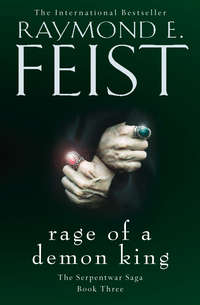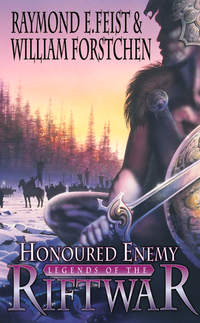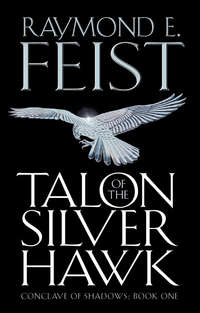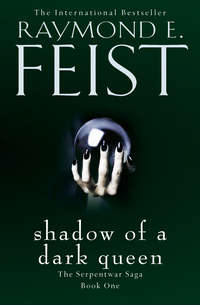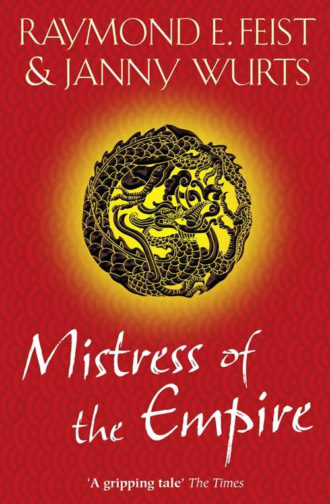
Полная версия
Mistress of the Empire
Mara clenched her teeth to keep from crying.
What prayer was there to be said that would not be tainted with rage, and what rebirth beyond being son of the Light of Heaven himself could await that was more honorable than heirship of the Acoma? As Mara shivered in pent fury, Hokanu’s arms closed around her. He murmured something she did not hear as the torches were lifted from their brackets around the circle and the aromatic wood was set alight. A cold band twisted itself around her heart. She watched the red-yellow flames lick upward, her thoughts very far from the present.
As the priest of Juran the Just approached to give her blessing, only Hokanu’s surreptitious shake prevented her from screaming curses at him, demanding to know what sort of justice existed in a world where little boys died before their mother’s eyes.
The flames crackled skyward, then sheeted over the pyre with a roar of disturbed air. The treated wood spared the sight of the boy’s body twisting and blackening in its embrace. Yet Mara looked upon the sight with every fiber of her body braced in horror. Her imagination depicted what lay at the heart of a brightness too dazzling for sight; her mind supplied the screams the boy had never uttered.
‘Ayaki,’ she whispered. Hokanu’s hold upon her tightened with enough force to recall her momentarily to propriety: to the stiff-faced mask that as Servant of the Empire she was expected to show in public grief. But the effort of holding her features immobile was enough to cause her to tremble.
For long minutes the crackle of flames vied with the voices of the priests who chanted their various prayers. Mara fought to control her breathing, to stave off the monstrous reality of her dead child vanishing into a roil of smoke.
For the death rite of one of lesser station, this would be time for the guests to file away, leaving those closest to the departed to a time of private mourning. But with the passing of the great, such courtesies were forborne. Mara was allowed no reprieve. At the forefront of the public eye she remained, while the acolytes of Turakamu threw consecrated oil upon the flames. Waves of heat rolled off the pyre, reddening Mara’s skin. If she shed any tears, they dried upon her cheeks in the face of that cruel furnace. Above writhing curtains of flame, the thick black smoke coiled skyward to draw notice from heaven that a spirit of high honor had departed.
The sun added to the blaze, and Mara felt sick and dizzy. Hokanu turned his body to shade her as he could. He dared not glance at her too often in concern, for fear of betraying her weakness, while the time dragged by as torture. Nearly an hour passed before the flame subsided; then more prayers and chanting followed as the wood-ashes were spread to cool. Mara all but swayed on her feet when the priest of Turakamu intoned, ‘The body is no more. The spirit has flown. He who was Ayaki of the Acoma is now here,’ he said, touching his heart, ‘here’ – he touched his head – ‘and in Turakamu’s halls.’
The acolytes braved the smoking embers as they picked their way to the heart of the mound of decimated fuel. One used a square of thick leather to drag out the warped blade of Ayaki’s sword, quickly passing the bundle to another who waited to quench the hot metal in wet rags. Steam rose to mingle with the smoke. Mara endured with deadened eyes as the priest of Turakamu employed an ornate scoop to fill the waiting urn with ashes. More wood than boy, the remains would become the symbol of the body’s interment in the glade of his ancestors. For the Tsurani believed that while the true soul traveled to the halls of the Red God, a small part of the spirit, the shade, would rest alongside its ancestors within the stone that was the natami of the house. That way the essence of the child would thus return in another life, while that which made him Acoma would remain to watch over his family.
Hokanu steadied his wife as two acolytes arrived before her. One offered the sword blade, which Mara touched. Then Hokanu took the twisted length of metal while the other acolyte surrendered the urn. Mara accepted the ashes of her son in trembling hands. Her eyes did not acknowledge what she held but remained fixed upon the scattered, charred wood that remained in the circle.
Hokanu touched her arm lightly and they turned as one. The drums boomed out as the procession veered around and resumed its march toward the Acoma contemplation glade. No impression of the walk registered upon Mara beyond the stony cold of the urn in her hands, warmed at the base by the still warm ashes inside. She set one foot before the other, barely aware of her arrival at the scrolled gateposts that marked the glade entrance.
The servants and Hokanu paused in deference to her; for the only one not of Acoma blood who was permitted to step through the arch and make his way along the stone path that led within was the gardener whose life had been dedicated to tend the glade. Here even her husband, who was still a Shinzawai, could not enter, upon pain of death. To allow any stranger admittance was to offer insult to the shades of Acoma ancestors, and to bring lasting disharmony to the peace that abided in the natami.
Mara stepped away from Hokanu’s embrace. She did not hear the murmur of the nobles who watched, pitying or predatory, until she had moved beyond sight behind the hedges. Once before, upon her family’s old estate, she had undertaken the terrible task of consecrating the shades of close family to the natami.
The size of this garden disoriented her. She paused, the urn clutched to her breast in stunned incomprehension. This was not the familiar glade of her childhood, where she had gone as a tiny girl to address the shade of her mother; this was not the known path where she had narrowly escaped death at the hands of a tong assassin while mourning her father and brother. This place was alien, vast, a wide park, in which several streams meandered. For a second a shadow crossed her heart as she wondered whether this garden that had been home to Minwanabi shades for so many centuries might reject the aspect of her son.
Again in her memory she saw the horse fall, a blackness like evil stamping out innocent life. Feeling lost, she gulped a breath. She chose a path at random, only vaguely recalling that all of them led to the same site where the ancient rock, the natami of her family, rested at the edge of a large pool.
‘I did not bury your natami deep below the Acoma’s,’ she said aloud to the listening air; a smaller voice inside her warned that she talked out of madness. Life was mad, she decided, or she would not be here making empty motions over the remains of her young heir. Her extraordinary display of graciousness in insisting that the Minwanabi natami be taken to a distant place and cared for, so that the shades of the Minwanabi might know peace, at this moment seemed empty folly.
She did not have the strength in her to laugh.
Mara curled her lip at the sour taste in her mouth. Her hair smelled of sweet oil and greasy smoke. The stench turned her stomach as she knelt on the sun-warmed ground. Next to the natami a hole had been dug, the damp soil piled to one side. Mara placed the fire-warped sword that had been her son’s most prized possession in the cavity, then tipped the urn to let his ashes pour over it. With bare hands she sifted the earth back into the hole and patted it down.
A white robe had been left for her beside the pool. On its silk folds lay a vial, and nearby, the traditional brazier and dagger. Mara lifted the vial and removed the stopper. She poured fragrant oils upon the pool. In the shimmers of fractured light that played upon its surface, she saw no beauty, but only the face of her son, his mouth wide with suffering as he struggled to draw his last breath. The rituals gave no release but seemed a wasting wind of meaningless sound. ‘Rest, my son. Come to your home soil and sleep with our ancestors.’
‘Ayaki,’ she whispered. ‘My child.’
She gripped the breast of her robe and pulled, tearing the cloth from her body, but unlike years before, when she had performed the ritual for her father and brother, no tears followed the violence. Her eyes remained painfully dry.
She plunged her hand into the almost extinguished brazier. The sting of the few hot cinders remaining was not enough to focus her thoughts. Grief remained a dull ache inside her as she smeared the ashes across her breasts and down her exposed stomach, to symbolise that her heart was ashes. In truth, her flesh felt as lifeless as the spent wood of the pyre. She slowly lifted the heirloom metal dagger, kept sharp for this ceremony over the ages. For the third time in her life, she drew the blade from its sheath and cut herself across the left arm, the hot pain barely felt in the fog of her despair.
She held the small wound over the pool, letting drops of blood fall to mix with the water, as tradition required. For more than a minute she sat motionless, until nature’s healing staunched the flow. A scab had half dried before she absently tugged at her robe, but she lacked the fierceness of will to fully sunder the garment. In the end, she simply dragged it over her head. It fell to earth, one sleeve soaking up oil and water from the pool.
By rote, Mara unfastened her hairpins, loosening her dark locks over her shoulders. Anger and rage, grief and sorrow should have driven her to pull upon her tresses, yanking handfuls lose. Her emotions only smoldered sullenly, like a spark smothered by lack of air. Boys should not die; to grieve for them in a fullness of passion was to abet the acceptance of their passing. Mara twisted at a few tangles, outwardly listless.
Then she settled back upon her heels and regarded the glade. Such immaculate beauty, and only she among the living could appreciate it. Ayaki would never perform the death rite for his mother. Hot tears erupted unbidden and she felt something of the hardness wedged within break loose. Mara sobbed, abandoning herself to an outpouring of grief.
But unlike before, when such release brought clarity, this time she found herself driven deeper into chaotic thought. When she closed her eyes, her mind whirled with images: first Ayaki running, then Kevin, the barbarian slave who had taught her of love, and who had time and again risked his life for her alien honor. She saw Buntokapi, sprawled on the red length of his sword, his great ham fists quivering closed as the life left his body. Again she acknowledged that her first husband’s death would forever be marked against her. She saw faces: her father and brother, then Nacoya, her nurse and foster mother.
All of them offered her pain. Kevin’s return to his own world was as painful a loss as death, and not one other had died as nature intended; all had been casualties of twisted politics, and of the cruel machinations of the Great Game.
The horrid certainty would not leave her, that Ayaki would not be the last boy to die for the empty ambitions of the nation’s Ruling Lords.
That reality struck her like torture: that Ayaki would not be the last. Howling in hysteria born of agony, Mara threw herself headlong into the pool.
The wetness swallowed her tears. Her sobs were wrenched short by a gasp as cold water sucked into her nostrils, and life recalled her to its own. She crawled back on dry earth, choking. Water streamed from her mouth and hair. She dragged in a hacking breath, then reached mechanically for the robe, its whiteness marred by dirt and sweet oil.
As if she were a spirit wearing the body of a stranger, she saw herself drag the fabric over her wet flesh. The hair she left bunched under the collar. Then the body that felt like a living prison gathered itself up and trudged back toward the entrance to the glade, where thousands waited with eyes hostile or friendly.
Their presence took her aback. In this Lord’s fatuous smile and that Lord’s leering interest, she saw the truth confirmed: that Ayaki’s death would happen again and again, and other mothers after her would howl useless outrage at the injustices of the Great Game. Mara glanced down to shut away the acknowledgment of futility. One of her sandals was missing. Mud and dust caked her bared foot, and she hesitated, debating whether to look for the lost footwear, or to fling the remaining sandal into the hedge.
What did it matter, a far-off voice reasoned inside her. Mara watched her misshod feet with fey detachment as the person that was herself left the glade. Passing between the shielding hedges, she did not look up as her husband hurried forward to take up his station at her elbow. His words did not soothe. She did not want to return from her inward retreat to work at sorting their meaning.
Hokanu shook her gently, forcing her to look up.
A man in red armor stood before her; thin, elegant, poised, he carried his chin at an arrogant angle. Mara stared at him, distracted. His eyes narrowed. He said something. The hand that held some object in it gestured, and something of the biting scorn that underlay his manner came through.
Mara’s gaze sharpened. Her eyes focused on the device upon the young man’s helm, and a deep quiver shook her.
‘Anasati!’ she said, a bite like a whip’s crack to her voice.
Lord Jiro gave back a chilly smile. ‘The Lady deigns to acknowledge me, I see.’
Wakened to a slow, spiraling rage, Mara stiffened.
She said nothing. Hokanu’s fingers wrenched unobtrusively at her wrist, a warning she did not acknowledge.
Her ears rang to a sound like a thousand enraged sarcats spitting in defiance, or torrents of storm-swollen rivers crashing down jagged rock.
Jiro of the Anasati raised the object he held, a small puzzle cleverly cut to a pattern of interlacing wooden hoops. He inclined his head in a formal bow, saying, ‘My nephew’s shade deserves remembrance from the Anasati.’
‘Remembrance!’ Mara said, in a high, tortured whisper. Inside her mind, her spirit howled: Anasati remembrance had sent her firstborn to a bed of ashes.
She did not remember moving; she did not feel the wrench of tendons as she yanked free of Hokanu’s restraint. Her scream of rage cut across the gathering like the sound of a drawn metal sword, and her hands rose like claws.
Jiro leaped back, dropping the puzzle in horrified astonishment. And then Mara was on him, clawing to reach his throat through the fastenings of his armor.
Those Lords standing nearest exclaimed in shock as this small woman, unarmed, dirty, and wet, threw herself at her former brother-in-law in a fit of pure fury.
Hokanu sprang with all his warrior’s quickness, fast enough to catch Mara back before she drew blood. He smothered her struggling body in his embrace.
But the damage by then was irrevocable.
Jiro glared around at the circle of stunned onlookers. ‘You all bear witness!’ he cried in an indignation that held an undertone of wild joy. Now he had the justification he had long wished for, to see the Lady Mara ground under his heel in utter defeat. ‘The Acoma have offered the Anasati insult! Let all present be informed that alliance is dead between our two houses. I claim my right to expunge this shame to my honor, and blood will be called for in payment.’
Конец ознакомительного фрагмента.
Текст предоставлен ООО «ЛитРес».
Прочитайте эту книгу целиком, купив полную легальную версию на ЛитРес.
Безопасно оплатить книгу можно банковской картой Visa, MasterCard, Maestro, со счета мобильного телефона, с платежного терминала, в салоне МТС или Связной, через PayPal, WebMoney, Яндекс.Деньги, QIWI Кошелек, бонусными картами или другим удобным Вам способом.


